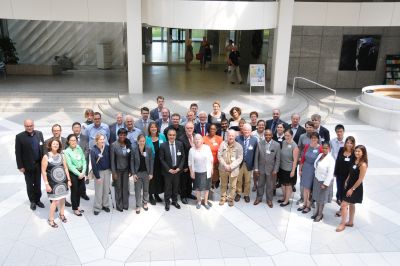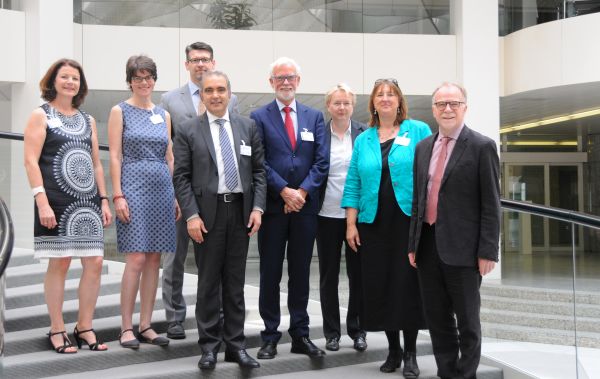
The UNESCO-UNEVOC International Centre: Who We Are | What We Do | Working With Us | Get in Touch
The UNEVOC Network: Learn About the Network | UNEVOC Network Directory
For Members: UNEVOC Centre Dashboard
Thematic Areas: Inclusion and Youth | Digital Transformation | Private Sector Engagement | SDGs and Greening TVET
Our Key Programmes & Projects: BILT: Bridging Innovation and Learning in TVET | Building TVET resilience | TVET Leadership Programme | WYSD: World Youth Skills Day
Past Activities: COVID-19 response | i-hubs project | TVET Global Forums | Virtual Conferences | YEM Knowledge Portal
Our Services & Resources: Publications | TVET Forum | TVET Country Profiles | TVETipedia Glossary | Innovative and Promising Practices | Toolkits for TVET Providers | Entrepreneurial Learning Guide
Events: Major TVET Events | UNEVOC Network News
UNESCO-UNEVOC in collaboration with the Federal Institute for Vocational Education and Training (BIBB) invited a select group of researchers from the UNEVOC network and beyond, in Bonn for an international workshop on “Work-based learning as a pathway to competence-based education – Research and implementation strategies from a comparative and global VET perspective”.

As a UNEVOC Centre in Germany, the Federal Institute for Vocational Education and Training (BiBB), hosted this workshop. Under the aegis of both the UNESCO-UNEVOC and BiBB, this workshop provided a platform for an exchange of ideas and collaborative engagement between TVET institutions and research partners worldwide. The discussions provided a global perspective on work-based learning as a pathway for competency-based education and the empirical evidence in its support. The main impetus of this workshop was to exchange views on how research in this area can be designed and implemented to yield improved work-based learning and enhance the associated benefits for individuals and employers/sectors.
In addition to hosting a number of researchers from different places, the workshop also included keynote addresses from representatives of UNESCO, BiBB, Griffith University (Australia) and Wageningen University (Netherlands)![]() . Speaking at the occasion, Mr. Friedrich Hubert Esser- President, BiBB, highlighted the critical role of WBL in the context of German industry and how the integration of effective WBL has improved the economic performance of the enterprises and individuals alike. Mr. Borhene Chakroun – Chief of the Youth, Literacy and Skills Development at UNESCO, also extoled the link of WBL to economic growth based on the aggregated gains made at the firm levels. He also highlighted its link to alleviating the youth unemployment. Mr. Martin Mulder from the Wageningen University explained three types of competencies and the need for TVET planners to integrate all three of them in TVET delivery: competencies for specific tasks, competencies for known tasks, and competencies for unknown tasks. Mr. Stephen Billet from the Griffith University Australia, highlighted that the workplace provides access to authentic and purposive activities, contextualised experiences, and guidance by more experienced co-workers and is as such a good environment for collecting experiences. Billett argued for curriculum pedagogy and personal epistemology practices as being central to understanding learning through practice and suggested to focus on “learning, interdependence and experiencing, rather than teaching, independence or experiences.”
. Speaking at the occasion, Mr. Friedrich Hubert Esser- President, BiBB, highlighted the critical role of WBL in the context of German industry and how the integration of effective WBL has improved the economic performance of the enterprises and individuals alike. Mr. Borhene Chakroun – Chief of the Youth, Literacy and Skills Development at UNESCO, also extoled the link of WBL to economic growth based on the aggregated gains made at the firm levels. He also highlighted its link to alleviating the youth unemployment. Mr. Martin Mulder from the Wageningen University explained three types of competencies and the need for TVET planners to integrate all three of them in TVET delivery: competencies for specific tasks, competencies for known tasks, and competencies for unknown tasks. Mr. Stephen Billet from the Griffith University Australia, highlighted that the workplace provides access to authentic and purposive activities, contextualised experiences, and guidance by more experienced co-workers and is as such a good environment for collecting experiences. Billett argued for curriculum pedagogy and personal epistemology practices as being central to understanding learning through practice and suggested to focus on “learning, interdependence and experiencing, rather than teaching, independence or experiences.”

L to R: Agnes Dietzen (BIBB), Anke Bahl (BIBB), Jens Liebe (UNESCO-UNEVOC), Borhène Chakroun (UNESCO), Martin Mulder (Wageningen University), Elisabeth Krekel (BIBB), Birgit Thomann (BIBB), Stephen Billett (Griffith University)
The workshop included the presentation and discussion of research papers on the following topics:
- Identification of conducive factors for learning on the level of individual subject and the work environment
- The role and nature of guidance and counselling available from tutors, fellow workers and instructors in WBL
- Curriculum development for WBL-schemes in schools, companies and institutions of higher education
- Boundary crossing: Options for the transfer of knowledge, skills and competences between contexts
- Challenges of formalizing the informal
The results of the workshop and the papers will be published in a forthcoming joint publication of BIBB and UNESCO-UNEVOC.